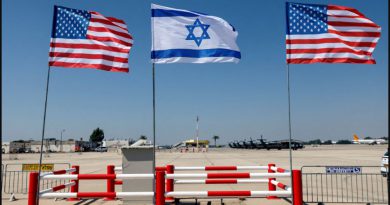The False Promise of Peace in the Middle-East: How Powers work in the Darkness
by Khaled Hamoud Alshareef
Tens of millions of people died and paid the price for the fragile independence of the Middle-Eastern countries, yet the colonial powers planted the seeds of hate, division and wars….
There has been a false promise of peace in the Middle-East, and the powers work in darkness to hinder peace and destabilize the fragile region by fighting real reformers and peace seeking leaders.
The Middle-East is a unique tragedy, a region that is the cradle of civilization. The region is interchangeable with the ‘Near East’, which has seen many of the world’s oldest cultures and civilizations, disasters and triumphs.
This history of the Middle-East started from the earliest human settlements, continuing through several major pre- and post-Islamic empires, to the nation-states of the Middle-East today.
Sumerians were the first people to develop complex systems as to be called “Civilization”, starting as far back as the 5th millennium BC. Egyptian civilization coalesced around 3150 BC with the political unification of Upper and Lower Egypt under the first pharaoh.
Mesopotamia was home to several powerful empires that came to rule almost the entire Middle-East—particularly the Assyrian Empires of 1365–1076 BC and the Neo-Assyrian Empire of 911–609 BC.
From the early 7th century BC and onwards, the Iranian Medes followed by the Achaemenid Empire and other subsequent Iranian states and empires dominated the region.
In the 1st century BC, the expanding Roman Republic absorbed the whole Eastern Mediterranean, which included much of the Near East.
The Eastern Roman Empire, today commonly known as the Byzantine Empire, ruling from the Balkans to the Euphrates, became increasingly defined by and dogmatic about Christianity, gradually creating religious rifts between the doctrines dictated by the establishment in Constantinople and believers in many parts of the Middle-East. From the 3rd century up to the course of the 7th century AD, the entire Middle-East was dominated by the Byzantines and the Sasanian Empire. From the 7th century, a new power was rising in the Middle-East, that of Islam.
The dominance of the Arabs came with a huge scientific and cultural evolution that came to a sudden end in the mid-11th century with the arrival of the Mongols mainly Turkic savages who brought the Seljuq and the Ottoman reigns that destroyed centuries of history and science.
The reign of the Ottoman Empire destroyed the once beautiful Middle-East and turned it into a living tragedy for 400 years of wars, ransacked history, art and culture, and banning advanced science in the most parts of the Middle-East.
The people of the Middle-East fought for their freedom in the late 19th century, only to fall into the greedy hands of the colonial powers in the early 20th century that carved these ancient civilizations between themselves by creating rifts which we still feel to this date.
Tens of millions of people died and paid the price for the fragile independence of the Middle-Eastern countries, yet the colonial powers planted the seeds of hate, division and wars by carving nations into borders among the other nations.
The Kurds lost their homeland Palestine with the capture of Damascus that ended up carving up Syria out of the Hashemites kingdom, that freed the people from the Ottomans only to fall under the French mandate and the Young Arab Society giving a rise to national socialists that ended up aligned with the Nazis in World War II.
The west mainly France and Great Britain are responsible for the bulk problems of the Middle-East. These powers are not helping, every time they interfere with the region they make things far worse, example the Khomeinist regime and Iranian revolution.
These powers kept the Middle-East from achieving its potential throughout the 20th and 21st century, adding insult to injury these colonial powers are preaching to their victims how they should live, interfering in their internal affairs and creating havoc in the process.
I think it is about time for Middle-Eastern nations to get over their own differences and engage in an alliance that’s beneficial to their people.
Featured-Image credits: www.OnManorama.com
Khaled Homoud Alshareef holds PhD in Business and he earned Masters in Philosophy. He often writes about Islamism, Islamist factions and modern Terrorism. He tweets under @0khalodi0.



